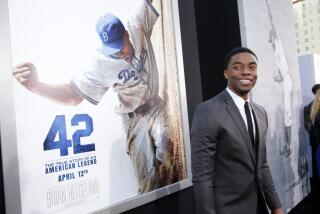‘Road’ sticks to the familiar Disney path
In 1966, Texas Western, a relatively small college of mining and metallurgy, stormed to the national collegiate men’s basketball championship over Adolph Rupp’s vaunted University of Kentucky Wildcats. It’s a terrific story of a team of Davids with hoop dreams running a gantlet of patrician Goliaths against a backdrop of momentous social change. The Miners, led by Coach Don Haskins, counted an unprecedented seven African Americans in its lineup, including the starting five in the final game, and changed the sociological makeup of the sport, paving the way for the integration of the major southern collegiate sports conferences.
“Glory Road” is a slick, entertaining version of that story, executed with crowd-pleasing efficiency by producer Jerry Bruckheimer, director James Gartner and screenwriters Christopher Cleveland and Bettina Gilois, but not surprisingly lacking in subtlety or complexity. Ripped directly from Disney’s playbook of inspirational sports movies, it’s devoid of any original elements that might deter it from that successful formula, hewing closer to the sentimental cliches of “Remember the Titans” than the much better “Miracle” or “The Rookie.”
As Denzel Washington (“Remember the Titans”) and Kurt Russell (“Miracle”) did before him, Josh Lucas steps into the role of a tough-talking, high-minded coach who teaches his players more than just a game. Haskins arrives at Texas Western (now the University of Texas-El Paso) to inherit a team notably short on talent. The film has Haskins leaping directly from coaching girls high school basketball to leading the Miners to the championship in his first season, though he actually arrived in El Paso in 1961, and minimal integration had already occurred. These changes seem less about heightened drama or economical storytelling than earning easy laughs.
Much of the first part of the movie plays like a culture-clash comedy. Haskins and assistant coach Moe Iba (Evan Jones) recruit from the playgrounds and gyms of the urban north and northeast, gobbling up talent that has been bypassed because of the color of a player’s skin. From Detroit, the Bronx, and Gary, Indiana, the black players arrive in West Texas and think they’ve landed on Mars. As fishes-out-of-water, they must adjust to Haskins’ harsh practices and the Tex-Mex culture before venturing into nearby Juarez for some forbidden entertainment.
They reaching a detente with the white players they’ve largely reduced to supporting roles and the team comes together in its first game when Haskins learns to incorporate the new players’ flashy playground game into his defense-first, team-oriented style. Derek Luke stars as the team’s best player, Bobby Joe Hill, who Haskins rides to stay as focused on his game as he is on his girlfriend, Tina (Tatyana Ali). The Miners become a juggernaut quickly rising in the national rankings as they move toward the showdown with all-white Kentucky.
The movie works as well as it does on the strength of the performances by Lucas and Luke, and the fact that the players were cast based both on their ability to act as well as play ball. Mehcad Brooks, Alphonso McAuley, Damaine Radcliff, Al Shearer, Sam Jones III and Schin A.S. Kerr do what they can with what are essentially one-dimensional roles, and each has his moment in the spotlight.
Emily Deschanel is largely wasted in the thankless role of Haskins’ supportive wife, but Jon Voight brings suitable gravitas in one of his prosthetically-enhanced cameos as the villainous Rupp.
The film takes a more serious tack in dealing with the increasing racism faced by the players as the team gains in prominence, although the filmmakers feel the need to embellish on it. In a story as important and inherently dramatic as this one, it seems unnecessary. While it’s a good thing that the film will draw increased attention to them, the team’s accomplishments and the subsequent impact are powerful enough to stand on their own.
*
‘Glory Road’
MPAA rating: PG for racial issues, including violence and epithets, and mild language
Times guidelines: One savage beating, not especially graphic
A Walt Disney Pictures film, released by Buena Vista Pictures Distribution. Director James Gartner. Producer Jerry Bruckheimer. Executive producers Mike Stenson, Chad Oman, Andy Given. Screenplay by Christopher Cleveland & Bettina Gilois. Directors of photography John Toon, Jeffrey L. Kimball. Editor John Wright. Costume designer Alix Friedberg. Music Trevor Rabin. Production designer Geoffrey Kirkland. Running time: 1 hour, 57 minutes.
In general release.
More to Read
Only good movies
Get the Indie Focus newsletter, Mark Olsen's weekly guide to the world of cinema.
You may occasionally receive promotional content from the Los Angeles Times.








